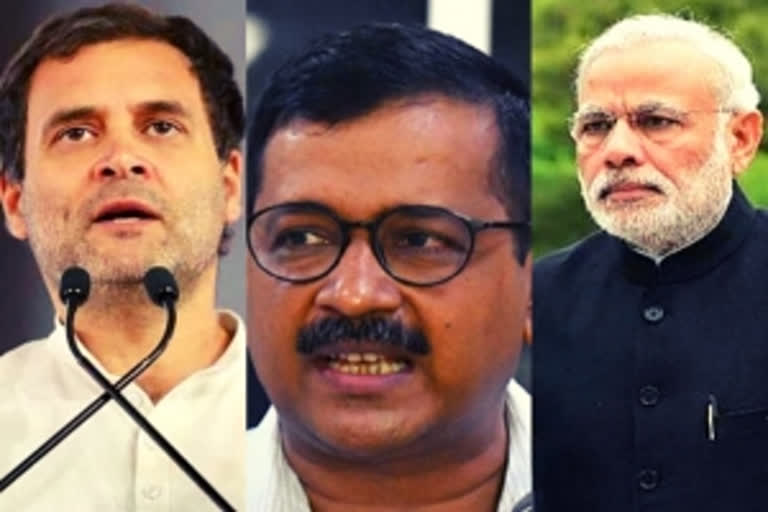Hyderabad: An aggressive well-funded campaign by the Bharatiya Janata Party (BJP) had created some doubts about the ability of the Aam Admi Party (AAP) to win the Delhi elections. But Arvind Kejriwal defeated not just self-doubts, but everything that the BJP leaders threw at him. AAP won 63 seats and is ready to rule Delhi for the next 5 years and enjoy the kind of freebie governance that has become an envy of other states, who are keen to replicate his model of free water and power.
In winning this election, which the BJP tried to turn the polls into a referendum on CAA and NRC, but AAP, unknowingly and unwittingly proved, through their win, that the concerns of the people of Delhi were different. They did not believe in BJP’s narrative that India was threatened by so-called outsiders that the government wanted to weed out through a national register of citizens.
The BJP tried to polarize the elections on religious lines by suggesting that the Shaheen Bagh protests, where women have been squatting for more than 60 days, anti-national and supported by forces inimical to national security. Surely it did not work nor did the vitriolic speeches by the likes of Union minister Anurag Thakur and Pravesh Verma.
UP Chief Minister Mahant Adityanath explored new depths when he tried to feed the stereotype about Muslims by repeating ad nauseum about 'biryani' and the felicity with which he could order firing on those who do not listen to him.
People in Delhi who used certain civilities in politics were horrified by his remarks, but as ECI was somnolent it encouraged some supporters to fire bullets at the protestors in Jamia and Shaheen Bagh. BJP thought that the inconvenience caused to people of Delhi would help them craft a narrative, but how wrong they were proved. Instead, the AAP’s number went up to 63 seats which is a resounding victory if we see that Kejriwal was fighting not just anti-incumbency of 6 years, but also the BJP’s campaign of aggressive nationalism.
Congress plummeted to new electoral lows. It lost its deposit in 67 assembly segments and many believe that there was a tacit understanding between the AAP and Congress. A senior Congress MP, KTS Tulsi, categorically claimed of such a compact. This impression is reinforced by the fact that the Congress did not wheel out either Priyanka or Rahul Gandhi until 72 hours before the day of voting.
They were swayed; it appears by a sneaky campaign led by many commentators that Congress had no role to play in these elections and it would be better for building resistance against the BJP that the grand old party should sit out these polls. What was ignored was that Congress had more to show in terms of the development work than AAP or BJP. Congress had emerged second in the 2019 parliament elections.
Another argument that was given to Congress leadership that they should stay away from Delhi elections was that it is like municipal polls and AAP, being an ideologically agnostic, had a better chance of winning it. The truth is if the Congress had fought aggressively then BJP would have been a major beneficiary. The few seats that the BJP won was due to Congress eating into AAP vote. In other words, the AAP has to be grateful to Congress for helping them win this crucial vote.
Interestingly, the Delhi elections took place when the capital was in ferment after the parliament passed the CAA. On December 15, the Delhi police in an attempt to break the anti- CAA protests entered Jamia Millia University campus and mercilessly beat up the students. Girl students were also not spared. The violent response of the state to student protest was numbing.
Around the same time, there was brutal suppression of student protests in Aligarh Muslim University and other campuses and cities of Uttar Pradesh. It was after Jamia incident that women of nearby Shaheen Bagh decided to sit in a nearby park, which grew into something far bigger in implications and symbolism. These women swore by the Indian constitution and routinely read its inclusive Preamble. Shaheen Bagh template spread all over the country and students were at the vanguard of this agitation. Everywhere they faced the blunt edge of the state and this rankled.
In a survey conducted by a news channel, it became apparent that more than 20 per cent of the youth had shifted away from the BJP. And it is this shift that hurt the BJP and their exclusionary and violent narrative.
In Delhi, there were instances where the youth fought with the elders on why they should not vote for the BJP. Some of them even, bizarrely, locked up their parents whom they thought would vote for the BJP.
Delhi elections suggest a deep cleavage that has developed in the capital. It is not just the minorities that are resisting the BJP, but the youth that has had the benefit of being exposed to secular education and recognize what they can lose if religious fascism grows in the country. This is the reason that every campus in the country is in ferment.
BJP leadership needs to introspect whether national security issues and aggressive religious polarization helps them in state elections or not.
Read:| Delhi Assembly Election: AAP's development vs BJP's CAA-NRC rhetoric



